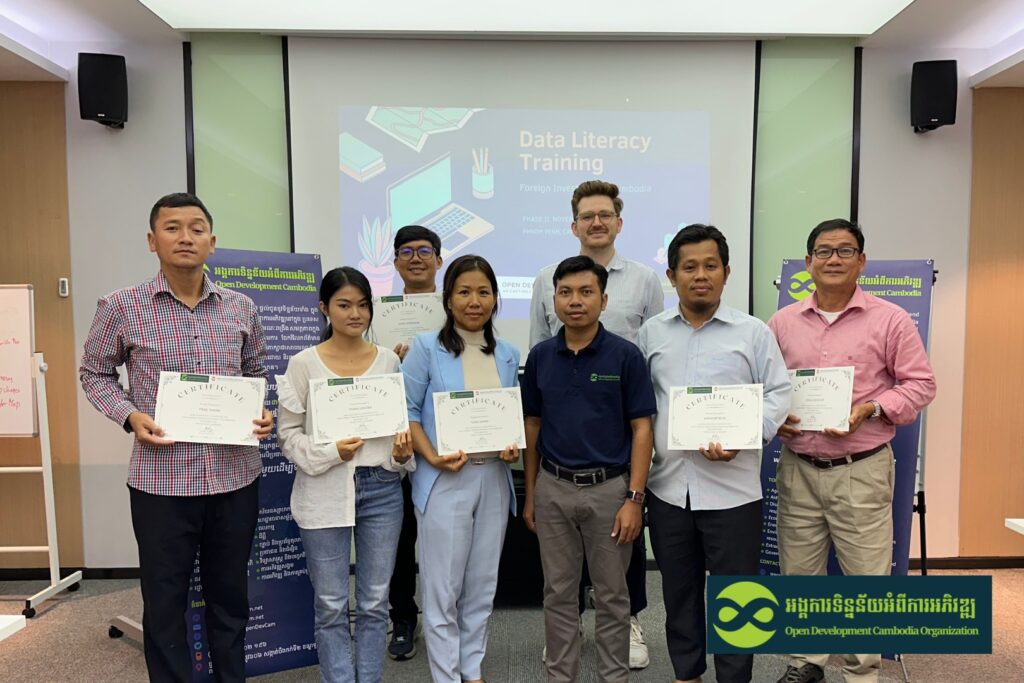ODC and ODM joined hands on data literacy training to boost evidence-based research and data-driven stories in Cambodia
Open Development Cambodia (ODC) and Open Development Mekong (ODM) co-organized the first data literacy course on foreign investment for civil society organizations, journalists, and researchers in Cambodia. This training program aims to improve the skills, knowledge, and understanding of data and its value, as well as introduce tools and applications for data collection and management. The training is divided into two phases; the first round was held on 17–20 October 2023, and brought in 11 participants (three females). The second round, held on 13-16 November 2023, gathered together seven candidates (two of them were female).

Mr. Arran Ridley, ODM’s Research and Editorial Manager; Mr. Vong Pisith, ODC’s Senior Data Research and GIS Officer /Capacity Building Coordinator; and Mr. Ban Chanphalla, ODC Social Development Editor/Researcher, collaborated for the first time on the two-week program. The three of them worked together to lead the training and guide the trainees through the process of learning data skills, developing a hypothesis and questions for a data narrative, and coming up with a project idea. This story can be creative, investigative, or report-based.
The trainers designed five training modules with activities to enable participants to generate a range of data visualizations and a data-driven story based on the data they have obtained.
- Module 1: From Evidence to Stories – To introduce data and how to use it to create stories. Through the analysis of a number of case studies, participants will explore how data from various sectors has been used to create data-driven stories.
- Module 2: Finding Data, Data Collection, and Data Formats – To introduce basic knowledge of data formats, the skills to find data online, sample tools that are used for collecting data, and the concepts to transform data into stories. Starting with a review of data formats, the unit moves on to techniques used to find, convert, and process data that is in different formats and how to develop a hypothesis and questions for a data story.
- Module 3: Understanding Data – To learn the basic concepts of data organization and cleaning, as well as questions to help source the data evaluation.
- Module 4: Data Visualization – To introduce the basics of effective communication with data visualization, focusing on best practices in visually communicating data and emphasizing techniques and tools that could be used to convey knowledge and information through visual stories, not just dry statistics.
- Module 5: Thinking Like a Data Journalist – To use all the data skills learned in the previous modules, participants will be divided into groups based on their interests and will dive into the relevant datasets in order to produce stories using these datasets.
A pre-test and post-test were used in the training to evaluate their degree of knowledge and discover areas for enhancement in future training. Following each session, participants have the opportunity to practice exercises with the data provided individually and as a group.
During the second week of the training session, participants developed their own project proposal for a data-driven story about the impact of major development projects on people and the environment, and they were given the chance to submit that project idea for mini-grants and mentorship.
Upon finishing the course, the trainers encouraged the participants to fill out a training assessment form, as well as open the floor up for the participants to reflect on after their active involvement. Participants expressed significant enthusiasm for the program in a pleasant-sounding development since they were able to acquire knowledge and techniques for their personal and professional advancement, particularly to apply to their actual work. The training program concluded with a certificate of completion ceremony for those who committed to attending the eight-day training courses.



























